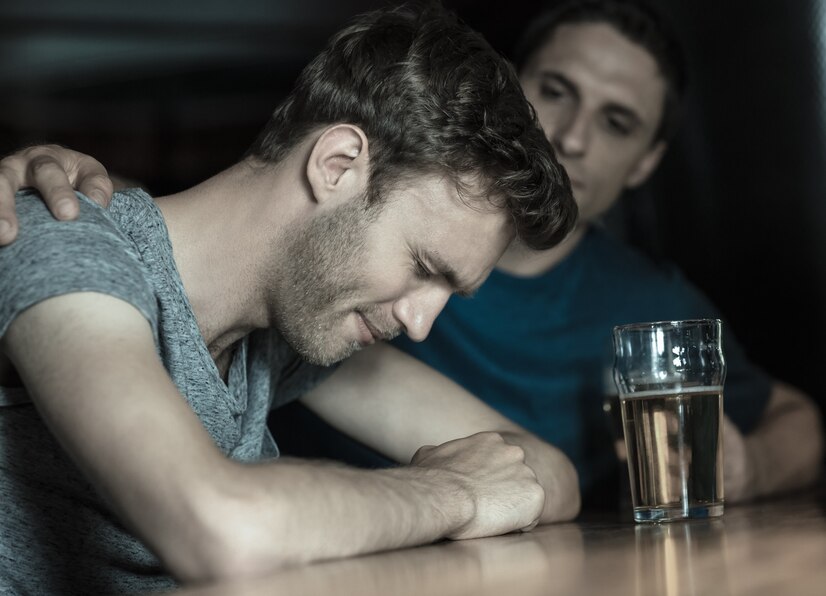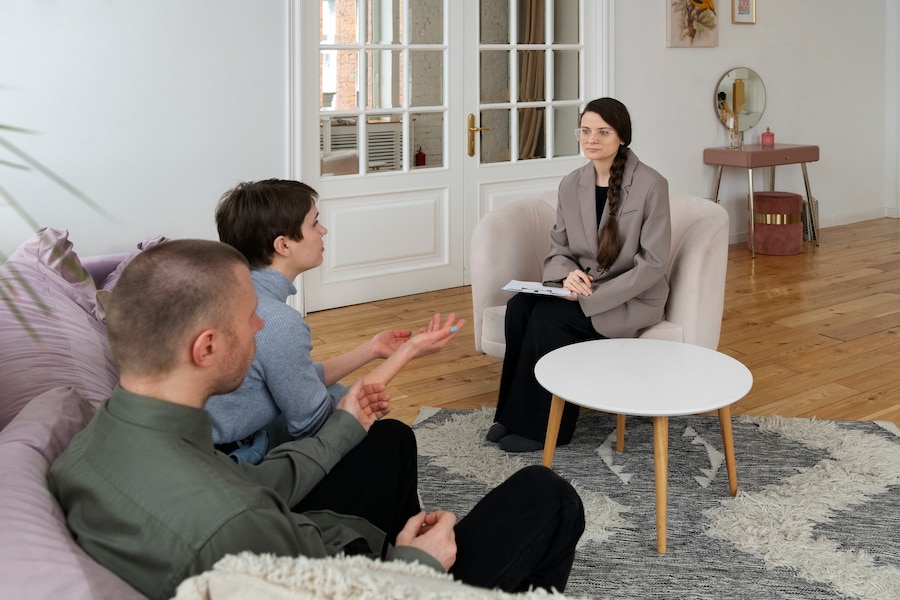Alcohol Addiction Treatment for Couples with Couples Rehabs
Couples Rehabs in Orange County is dedicated to offering specialized addiction treatment designed specifically for couples facing substance abuse challenges. Recognizing the complexity of addiction when both partners are involved, Couples Rehabs integrates therapeutic approaches that address both individual and relational aspects of recovery. This dual-focus approach not only seeks to heal the addiction but also to strengthen the relationship, ensuring that both partners can rebuild their lives together.
By combining relationship counseling with addiction treatment, Couples Rehabs provides a comprehensive program that supports both partners in their recovery journey. The goal is to address the underlying issues contributing to addiction within the context of the relationship, fostering mutual support and understanding. This method aims to enhance both personal and relational healing, offering couples a pathway to a healthier, substance-free future together
Treatment Services for Couples 888-325-2454
Understanding the Impact of Alcohol Addiction on Relationships
Communication Breakdown
Alcohol addiction often leads to a breakdown in communication between partners. The impaired judgment and emotional instability associated with excessive drinking can cause frequent misunderstandings and arguments. The affected partner may struggle to articulate their thoughts and feelings effectively, leading to frustration and confusion for both individuals. Over time, this disruption in communication can create a chasm between partners, making it challenging to resolve conflicts and maintain a healthy dialogue.
Erosion of Trust
Trust is a fundamental component of any relationship, and alcohol addiction can severely undermine it. The addict’s secrecy about their drinking habits, dishonesty regarding their behavior, and frequent broken promises can erode the trust that partners have in each other. This erosion of trust can lead to a persistent sense of betrayal and emotional distance. The partner who is not addicted may feel isolated and unsupported, exacerbating feelings of resentment and frustration.
Emotional and Physical Strain
The emotional toll of living with an alcohol addict can be significant. Partners may experience heightened stress, anxiety, and emotional fatigue as they cope with the unpredictable behavior of the addict. This strain can also manifest physically, with the non-addicted partner experiencing health issues related to stress and emotional burden. The constant emotional rollercoaster can lead to burnout, impacting both partners’ overall well-being and the relationship’s stability.
Impact on Intimacy
Intimacy can be deeply affected by alcohol addiction. The emotional distance created by addiction can reduce physical and emotional closeness between partners. Alcohol abuse may lead to a lack of interest in intimacy or sexual activity, further straining the relationship. The addict’s preoccupation with alcohol can overshadow the emotional needs of their partner, leading to a diminished sense of connection and satisfaction in the relationship.
Role of Treatment in Healing
Specialized addiction treatment for couples addresses these multifaceted issues. Therapy aims to improve communication, rebuild trust, and restore emotional and physical intimacy. By focusing on both individual and relational aspects of addiction, couples can work together to heal and strengthen their relationship. Through a supportive therapeutic process, partners can develop healthier patterns of interaction, foster a deeper emotional connection, and create a more balanced and fulfilling relationship.
Emotional and Psychological Strain
The emotional toll of alcohol addiction on a relationship can be profound. Partners may experience feelings of frustration, anger, and helplessness. The addiction often leads to emotional instability, with one partner’s struggles impacting the mental health and well-being of the other. Addressing these psychological strains is crucial for both partners to recover and rebuild their relationship.
Benefits of Couples-Focused Treatment
Enhanced Communication Skills
Couples-focused treatment emphasizes improving communication between partners. By providing tools and strategies to facilitate open and honest dialogue, therapy helps partners express their feelings, needs, and concerns more effectively. This enhanced communication can reduce misunderstandings and conflicts, fostering a more supportive and understanding relationship.
Strengthened Relationship Dynamics
Addressing both partners’ addiction issues simultaneously allows for a more comprehensive approach to treatment. Couples-focused therapy helps partners understand how their addiction impacts their relationship and works on rebuilding trust and intimacy. By focusing on shared goals and mutual support, couples can strengthen their bond and create a healthier dynamic in their relationship.
Improved Individual and Relational Healing
Couples-focused treatment supports individual recovery while also addressing relational issues. By simultaneously working on personal addiction challenges and relationship dynamics, partners can achieve more holistic healing. This integrated approach ensures that both individuals receive the support they need, leading to more sustainable recovery and a healthier relationship.
Development of Coping Strategies
In therapy, couples learn coping strategies for managing stress, triggers, and conflicts. These skills are crucial for handling the challenges of recovery and maintaining sobriety. By developing effective coping mechanisms together, couples can support each other in navigating the ups and downs of recovery, reducing the likelihood of relapse and promoting long-term success.
- Techniques such as Cognitive Behavioral Therapy (CBT)
Cognitive Behavioral Therapy (CBT) is a therapeutic approach that aims to modify negative thought patterns and behaviors. In couples counseling, particularly for addiction, CBT helps partners recognize and challenge detrimental beliefs and behaviors related to substance abuse. The goal is to replace these harmful patterns with healthier, more constructive alternatives.
Application in Addiction Treatment
In the context of addiction, CBT helps couples identify how their thoughts and behaviors contribute to substance abuse. For instance, partners might uncover underlying beliefs that justify or perpetuate their addiction. CBT assists in addressing these thoughts, promoting healthier coping strategies and decision-making. This approach encourages couples to understand the interplay between their thoughts, emotions, and behaviors, leading to more effective management of addiction.
- Emotionally Focused Therapy (EFT)
Emotionally Focused Therapy (EFT) is a therapeutic approach that aims to strengthen emotional bonds between partners. It focuses on understanding and expressing emotions in a supportive and constructive manner. EFT is grounded in the belief that emotional connections are essential for healthy relationships and that addressing emotional needs can lead to deeper intimacy and relational healing.
Application in Addiction Treatment
In the context of addiction, EFT helps couples reconnect on an emotional level, which can be profoundly disrupted by substance abuse. Addiction often leads to emotional distance, misunderstandings, and unresolved conflicts. EFT works to address these issues by creating a safe space where partners can openly express their feelings and experiences related to the addiction. By exploring and validating each other’s emotions, couples can rebuild their emotional connection and work through the underlying issues contributing to their substance abuse.

Integrated Treatment Programs
Integrated treatment programs are designed to address both substance abuse and co-occurring mental health disorders simultaneously. This approach recognizes that individuals with addiction often face additional psychological challenges, such as anxiety, depression, or trauma, which can complicate recovery. By offering a comprehensive treatment plan that targets both issues, integrated programs provide a more holistic and effective approach to healing.
Benefits
1. Comprehensive Care
Integrated treatment programs provide comprehensive care by combining therapies that address both substance abuse and mental health issues. This approach ensures that all aspects of an individual’s condition are treated concurrently, rather than sequentially. It helps prevent gaps in treatment and reduces the risk of one issue exacerbating the other.
2. Improved Outcomes
Research has shown that integrated treatment programs lead to better outcomes for individuals with co-occurring disorders. By addressing both substance abuse and mental health simultaneously, individuals are more likely to achieve long-term recovery and experience improvements in their overall well-being. Integrated care often leads to higher rates of treatment adherence and reduced relapse rates.
3. Coordinated Care
In integrated treatment programs, various healthcare professionals, including therapists, counselors, and medical providers, work collaboratively to create a unified treatment plan. This coordinated approach ensures that all aspects of an individual’s care are aligned and that communication among providers is streamlined. Coordinated care helps avoid conflicting recommendations and promotes a more cohesive treatment experience.
4. Personalized Treatment
Integrated programs are tailored to meet the unique needs of individuals with co-occurring disorders. Treatment plans are customized based on a thorough assessment of each person’s substance abuse issues, mental health conditions, and personal goals. This personalized approach ensures that the treatment is relevant and effective, addressing specific challenges and fostering a more supportive recovery process.
Holistic Approaches
Holistic approaches at Couples Rehabs emphasize treating the whole person rather than solely focusing on the addiction itself. These approaches incorporate practices that address mental, physical, and spiritual well-being, fostering a more balanced and comprehensive recovery process. By integrating various therapeutic techniques, holistic treatment aims to support overall health and promote sustainable recovery.
Mindfulness
Mindfulness practices play a crucial role in holistic treatment by encouraging individuals to be present and fully engaged in the moment. This practice helps reduce stress, enhance self-awareness, and improve emotional regulation. For couples in recovery, mindfulness can facilitate better communication, reduce anxiety, and promote a deeper understanding of each other’s experiences and emotions. Techniques such as meditation and deep breathing exercises are commonly used to cultivate mindfulness and support emotional stability.
Yoga
Yoga is another integral component of holistic approaches at Couples Rehabs. This practice combines physical postures, breathing exercises, and meditation to enhance physical fitness, mental clarity, and emotional resilience. Yoga helps individuals manage stress, improve flexibility, and foster a sense of inner peace. In the context of addiction recovery, yoga can aid in addressing physical discomfort, promoting relaxation, and supporting overall well-being. For couples, practicing yoga together can strengthen their bond and create a shared sense of tranquility.
Nutrition Counseling
Nutrition counseling addresses the physical aspect of recovery by focusing on healthy eating habits and overall nutritional balance. Proper nutrition is essential for restoring physical health, managing withdrawal symptoms, and supporting cognitive function. A balanced diet can also enhance mood and energy levels, contributing to a more stable recovery process. Nutrition counseling at Couples Rehabs provides guidance on making healthy food choices, understanding the impact of nutrition on addiction recovery, and developing sustainable eating habits.
Spiritual Well-being
Addressing spiritual well-being is a key aspect of holistic approaches, particularly in faith-based treatment programs. This component encourages individuals to explore and nurture their spiritual beliefs and practices, which can provide a source of strength, hope, and purpose in recovery. Spiritual well-being may involve practices such as prayer, meditation, and participation in religious or spiritual communities. For couples, shared spiritual practices can deepen their connection and offer additional support in navigating the challenges of recovery.
Supporting Overall Wellness
Holistic therapies complement traditional addiction treatments by promoting overall wellness. By integrating practices that enhance self-care and stress management, couples can improve their emotional resilience and maintain a healthier lifestyle, which supports long-term recovery and relationship stability.
Challenges and Considerations
Navigating Relational Dynamics
Navigating relational dynamics is a central challenge in couples addiction treatment, as the interplay between individual and relationship issues can significantly impact the effectiveness of the recovery process. Power imbalances, where one partner may dominate or control the other, can create an unhealthy environment that undermines treatment goals. Such imbalances can lead to ongoing conflicts and hinder the development of a balanced and equitable relationship. Addressing power dynamics involves fostering open communication and mutual respect, ensuring that both partners are equally involved in the recovery process and decision-making.
Codependency is another critical issue that often emerges in couples dealing with addiction. Codependent relationships are characterized by excessive reliance on one another for emotional support, which can perpetuate unhealthy patterns and enable addictive behaviors. This dynamic can create a cycle where both partners become enmeshed in each other’s problems, making it difficult to address individual needs and promote personal growth. Effective therapy for codependency focuses on helping each partner establish healthy boundaries, encourage self-reliance, and develop individual coping strategies that support their recovery and relationship health.
Unresolved conflicts also pose a significant challenge in couples addiction treatment. Lingering issues and past grievances can create ongoing tension, making it difficult for couples to progress in their recovery journey. Therapy aims to provide a safe space for addressing these conflicts, promoting open dialogue, and developing constructive resolution strategies. By focusing on understanding each other’s perspectives and finding mutually acceptable solutions, couples can work through their disagreements and build a stronger, more resilient relationship. Addressing relational dynamics comprehensively enhances the overall treatment experience, supporting both individual and relationship recovery goals.
Commitment to Change
Successful treatment in couples addiction recovery hinges on a strong commitment to change from both partners. This commitment involves a readiness to actively participate in therapy, confront challenging issues, and adopt new behaviors that support recovery. Both partners need to be equally invested in the process, as shared dedication is crucial for making meaningful progress and achieving lasting results. Without this mutual commitment, the effectiveness of treatment can be compromised, and the likelihood of sustained recovery diminishes.
Active participation in therapy requires couples to engage in self-reflection and be open to feedback. This means being willing to explore and address underlying issues contributing to addiction and relational problems. It also involves making a concerted effort to apply new coping strategies and communication techniques learned during therapy. Couples who are committed to change are more likely to confront difficult topics head-on, work through conflicts constructively, and support each other’s personal and relational growth.
Implementing new behaviors is another key aspect of commitment to change. This includes making adjustments in daily routines, improving communication, and fostering healthier interactions. For change to be effective, both partners must consistently practice these new behaviors and remain focused on their recovery goals. By embracing these changes, couples can build a stronger foundation for their relationship and enhance their overall well-being. Commitment to change is not a one-time effort but an ongoing process that requires dedication and perseverance from both partners to ensure long-term success in their recovery journey.
Find Alcohol Addiction Treatment at Couples Rehabs
Couples addiction treatment at Couples Rehabs offers a comprehensive and nuanced approach to addressing both substance abuse and relational issues. This treatment model recognizes the unique challenges faced by couples and provides tailored support to promote mutual understanding, effective communication, and holistic well-being. By focusing on the interplay between addiction and relationship dynamics, Couples Rehabs helps partners navigate their recovery journey together, fostering a supportive environment that enhances both individual and relational growth.
Investing in this specialized treatment not only aids couples in overcoming addiction but also strengthens their relationship foundation. The combination of targeted therapies, holistic practices, and a commitment to mutual support equips couples with the tools needed to build healthier interactions and sustain long-term recovery. Through dedicated effort and comprehensive care, couples can achieve a more resilient relationship and enjoy lasting personal and relational transformation.
Couples Rehabs stands as a valuable resource for those seeking to address addiction while improving their relationship dynamics. By embracing this integrated approach, couples can find a supportive and effective path to recovery, leading to improved quality of life and a stronger, more fulfilling partnership. Contact us today to learn more about how our specialized programs can help strengthen both your relationship and your recovery journey.

1. My partner and I both struggle with alcohol addiction. Can Couples Rehabs offer treatment programs for couples?
Answer: Absolutely! Couples Rehabs specializes in alcohol addiction treatment programs designed for couples. We understand the unique challenges faced by couples battling addiction together, and our programs provide support and guidance for healing as a unit.
2. What are the benefits of attending alcohol addiction treatment together as a couple?
Answer: Couples treatment offers numerous benefits:
- Shared recovery journey: Supporting each other through treatment strengthens your bond and fosters accountability.
- Improved communication: Couples therapy helps develop healthy communication skills for open and honest conversations about addiction and recovery.
- Relapse prevention: Learning coping mechanisms together equips you to face challenges and prevent relapse as a couple.
- Stronger relationship: Overcoming addiction together can rebuild trust and strengthen your relationship foundation.
3. What happens during alcohol addiction treatment for couples at Couples Rehabs?
Answer: Our programs combine individual therapy sessions with tailored couples therapy. You’ll also participate in group sessions with other couples facing similar challenges.
4. Will individual needs be addressed in couples alcohol addiction treatment at Couples Rehabs?
Answer: Absolutely! We understand individual needs within a couple. Individual therapy sessions allow you to address personal struggles related to alcohol addiction in a safe space.
5. What types of therapy are used in alcohol addiction treatment for couples at Couples Rehabs?
Answer: We utilize various evidence-based therapies, including:
- Cognitive-behavioral therapy (CBT): Identifying and changing negative thought patterns that contribute to addiction.
- Couples therapy: Developing healthy communication skills and addressing relationship issues related to alcohol abuse.
- Motivational interviewing: Encouraging and supporting each other’s commitment to recovery.
6. Is Couples Rehabs’ alcohol addiction treatment program confidential?
Answer: Confidentiality is a cornerstone of our treatment approach. We ensure your privacy and the security of your personal information throughout the program.
7. What happens if only one partner in the couple wants to attend alcohol addiction treatment at Couples Rehabs?
Answer: We encourage both partners to participate for optimal results. However, we still offer support for individuals seeking to recover while their partner is not yet ready.
8. What are the costs associated with alcohol addiction treatment for couples at Couples Rehabs? Does insurance cover it?
Answer: Costs vary depending on program duration and intensity. We offer flexible payment options and work with most major insurance providers to maximize your coverage for treatment.
9. How long does alcohol addiction treatment for couples typically last at Couples Rehabs?
Answer: The program length is individualized. Options range from intensive 30-day programs to longer-term programs catering to specific needs.
10. What happens after completing alcohol addiction treatment for couples at Couples Rehabs?
Answer: We prioritize long-term recovery. Our team will develop an aftercare plan tailored to your specific needs. This may include support groups, relapse prevention strategies, and ongoing therapy to maintain your sobriety journey together.
11. Is alcohol addiction treatment for couples at Couples Rehabs co-ed or gender-specific?
Answer: We offer both co-ed and gender-specific programs to cater to individual preferences and comfort levels.
12. Will couples therapy address codependency issues related to alcohol addiction at Couples Rehabs?
Answer: Absolutely! Codependency is a common challenge in relationships affected by addiction. Couples therapy helps identify and address codependency issues, fostering healthy interdependence within your relationship.
13. What if one partner has a more severe alcohol addiction than the other? Can Couples Rehabs still help?
Answer: Absolutely! Our programs are designed to meet the needs of both partners. Individualized treatment plans ensure each person receives the support needed for successful recovery.













Recent Comments